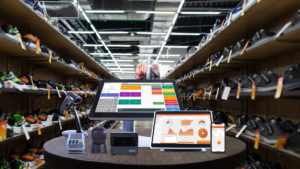Point of Sale (POS) software is a vital tool for businesses of all sizes, enabling efficient transactions and streamlining operations. In today’s fast-paced retail environment, having the right POS software can make a significant difference in managing sales, inventory, and customer interactions.
POS Software
POS software (Point of Sale) is a computer program designed to facilitate transactions and record essential data related to sales and inventory. It serves as the central hub for processing transactions, managing inventory levels, and generating reports to aid in decision-making.
Key Features of POS Software
Inventory Management: One of the primary functions of POS (Point of Sale) software is to track inventory levels in real-time, allowing businesses to efficiently manage stock and avoid stockouts or overstock situations.
Sales Tracking: POS software records every sale made, providing detailed insights into product performance, peak selling times, and customer preferences.
Reporting and Analytics: POS systems generate comprehensive reports on various aspects of the business, such as sales trends, inventory turnover rates, and employee performance, empowering businesses to make data-driven decisions.
Integration Capabilities: Modern POS software often integrates with other business systems, such as accounting software, e-commerce platforms, and customer relationship management (CRM) tools, enabling seamless data exchange and streamlining operations.

Types of POS Software
POS software comes in different forms to cater to the diverse needs of businesses:
On-premise POS Systems:
Traditionally, POS systems were installed on-site and operated using in-house servers. While these systems offer full control over data and operations, they require substantial upfront investment and ongoing maintenance.
Cloud-based POS Systems:
Cloud-based POS systems, on the other hand, operate on remote servers accessed via the internet. They offer greater flexibility, scalability, and accessibility, as businesses can access their POS systems from any device with an internet connection.
Mobile POS Systems:
Mobile POS systems utilize smartphones or tablets as the primary interface for processing transactions. These systems are particularly popular in industries such as food trucks, pop-up shops, and mobile service providers.
How Does POS Software Work?
Point-of-Sale Process: When a customer makes a purchase, the POS software processes the transaction by capturing product information, calculating the total amount due, and generating a receipt. It also updates inventory levels in real-time to reflect the sale.
Backend Operations: Behind the scenes, POS software performs various tasks, such as updating product databases, synchronizing data across multiple locations, and generating reports for analysis.
Data Synchronization: For businesses with multiple locations or online sales channels, POS software ensures that all data is synchronized in real-time, providing a unified view of operations across the organization.

Benefits of Using POS Software (Point of Sale)
Improved Efficiency: POS software automates repetitive tasks, such as inventory management and sales tracking, freeing up time for employees to focus on serving customers and growing the business.
Enhanced Accuracy: By digitizing transactions and inventory records, POS software minimizes human error, leading to more accurate financial reporting and inventory management.
Better Customer Experience: Fast and efficient transactions, personalized service, and seamless payment options contribute to a positive shopping experience, fostering customer loyalty and repeat business.
Factors to Consider When Choosing popular POS Software
Business Size and Type: The needs of a small retail store differ from those of a large restaurant chain, so it’s essential to choose POS software that aligns with the specific requirements of your business.
Scalability: As your business grows, your POS systems should be able to scale accordingly, accommodating an increasing number of transactions, users, and locations.
Integration Options: Consider whether the POS software integrates with other tools and systems you use, such as accounting software, e-commerce platforms, and marketing tools, to streamline operations and data management.
Cost: Evaluate the total cost of ownership, including upfront fees, subscription costs, and any additional hardware or software requirements, to ensure that the POS software fits within your budget.
Popular POS Software Providers
Several POS software providers offer a range of solutions tailored to different industries and business sizes:
- Ehishab: Ehishab is a popular POS software designed to streamline business operations and enhance customer experience. This is the best POS software in Bangladesh.
- Square: Known for its user-friendly interface and affordable pricing, Square offers POS solutions suitable for small businesses, including retail stores and restaurants.
- Shopify POS: Integrated with the Shopify e-commerce platform, Shopify POS allows businesses to seamlessly manage both online and offline sales channels.
- Toast: Designed specifically for the restaurant industry, Toast offers POS software that includes features such as tableside ordering, inventory management, and reporting tools. Toast is a popular POS Software.
Future Trends in POS Software
Artificial Intelligence:
AI-powered POS systems can analyze sales data, predict customer preferences, and offer personalized recommendations, enhancing the overall shopping experience and driving sales.
Contactless Payments:
With the rise of contactless payment methods, such as mobile wallets and NFC technology, POS software will continue to evolve to support these payment options, providing customers with greater convenience and security.
Blockchain Technology:
Blockchain technology has the potential to revolutionize POS systems by providing transparent and secure transactions, reducing the risk of fraud and improving trust between buyers and sellers.

Security Considerations with POS Software
Data Encryption:
POS software should encrypt sensitive customer data, such as payment card information, to protect it from unauthorized access and ensure compliance with data protection regulations.
PCI Compliance:
Businesses that accept credit and debit card payments must adhere to Payment Card Industry Data Security Standard (PCI DSS) requirements to safeguard cardholder data and prevent security breaches.
Regular Updates and Patches:
POS software vendors should regularly release updates and patches to address security vulnerabilities and protect against emerging threats, ensuring that businesses remain secure and compliant.
Challenges of Implementing POS Software
Training Staff:
Introducing new POS software requires training employees to use the systems effectively, which can be time-consuming and disruptive to daily operations.
Technical Issues:
Like any technology, POS software may encounter technical glitches or compatibility issues, requiring prompt troubleshooting and support from the vendor.
Cost of Implementation:
While POS software offers numerous benefits, the initial cost of implementation, including hardware, software licenses, and training, can be significant for small businesses with limited resources.
Tips for Maximizing the Use of POS Software
Regular Training Sessions:
Continual training and refresher courses can help employees stay up-to-date with the latest features and functionalities of the POS software, maximizing its potential.
Utilizing Advanced Features:
Explore the full capabilities of your POS software, such as loyalty programs, customer relationship management, and analytics tools, to gain a competitive edge and drive business growth.
Seeking Customer Feedback:
Listen to your customers’ feedback regarding their experience with the POS system, identify areas for improvement, and implement changes to enhance their overall satisfaction.

Conclusion
POS software plays a crucial role in modern business operations, enabling efficient transactions, streamlined inventory management, and enhanced customer experiences. By understanding the key features, types, and benefits of POS software, businesses can choose the right solution to meet their specific needs and drive growth in an increasingly competitive market.



